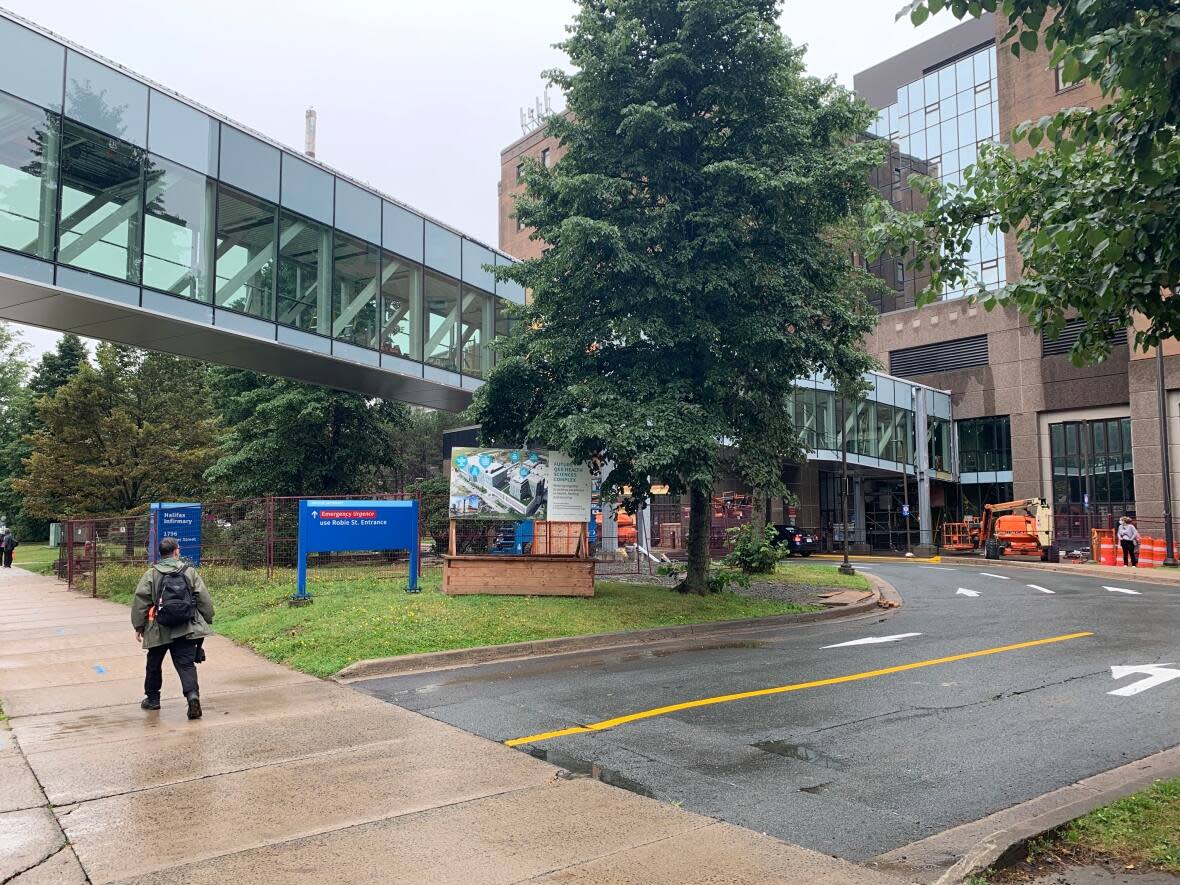N.S. government unveils significant expansion of hospital redevelopment project

The Nova Scotia government is preparing to embark on an ambitious health-care infrastructure plan that will add more beds, operating rooms and emergency departments across the Halifax Regional Municipality, but it comes without a final price tag or even a cost estimate.
Premier Tim Houston announced Thursday the much-delayed redevelopment of the Halifax Infirmary would proceed as a public-private partnership with PCL Plenary Health, but the work — which will include a new emergency department — would be staggered to get the most urgent portions done sooner.
"Nova Scotians deserve better than to be told to wait a decade or more," Houston told reporters at a news conference in Halifax.
"That's not good enough for them and it's not good enough for me."

Houston said the new plan would reduce construction timelines for some work while addressing needs not included in the original QEII New Generation plan. Despite being announced in 2015, Houston said the original plan was 10 years away from being completed.
Along with the new emergency department, the infirmary site will be getting 72 more in-patient beds than originally planned and 16 new operating rooms, four more than originally planned.
The infirmary will still house a new cancer centre, but initial construction at the site will focus on the new operating rooms, in-patient beds and other critical care services.
More than 400 new beds for HRM
In total, projects announced Thursday would add 423 beds to the system in the Halifax Regional Municipality.
Along with the work at the Halifax Infirmary, officials announced plans to expand the emergency department at the Dartmouth General Hospital and spend $13.9 million to buy the East Coast MediCenter Building, home of Scotia Surgery. The province has a partnership with the private clinic in Dartmouth to perform certain surgeries.
There are also plans to expand the Cobequid Community Health Centre in Lower Sackville, adding a site on adjacent property owned by the province to create 36 in-patient beds where right now there are none. The emergency department there will also be assessed for expansion or replacement.

The government will build two transition community centres with the intention of moving people who are unnecessarily occupying acute care beds in hospital to a more appropriate level of care before they can return home or be placed in a long-term care home.
"It will alleviate not just [pressures in] our emergency rooms, but may also alleviate some pressure in our long-term care facilities as well," said Health Minister Michelle Thompson.
One of those sites will be built next to the new outpatient centre in Bayers Lake. The government will spend $2.5 million to buy land from Banc Commercial Holdings. The other site, also to be located in HRM, has yet to be finalized.
Whatever it costs, it will cost. We're going to get it done. - Premier Tim Houston
Other projects announced Thursday include expanded mental health and addictions services at the site of the Nova Scotia Hospital, a new heart health centre, a new rehabilitation and arthritis centre, and a new home for the Mackenzie lab, a site that has been plagued with problems for years.
The work will be staggered and stretch to 2037 and beyond.
Houston said the cost of the work would be "in the billions," though he does not have a full estimate yet.
"We're not trying to save money on health care. We're trying to get it right," he said. "Whatever it costs, it will cost. We're going to get it done."
CBC News reported last week that government estimates for the Halifax Infirmary redevelopment, which at the time did not include a new emergency department or as many beds and operating rooms as were announced Thursday, was $2.8 billion.
Adding the new work at the infirmary, along with all the other projects announced Thursday, will push that number much higher.
Opposition calls for cost transparency
NDP Leader Claudia Chender said she's pleased with the new plans for the health-care system, but is concerned the government is continuing with a public-private partnership for the infirmary and didn't come prepared with more details about what the overall cost would be to the public.
"We want transparency," she said. "People want to understand how much it's going to cost. People want to know what the impact will be on the provincial budget and that the money is being spent well."
Liberal health critic Brendan Maguire said the plan for more facilities is a good step, but he was also struck by the lack of numbers provided by officials.
"You wouldn't build a house without knowing the cost," he said. "Historically, when we see projects of this magnitude and we don't have financial details, they tend to balloon out of cost."

Gerard Jessome, chief executive of engineering for the province's Public Works Department, said the changes announced Thursday reflect a major shift in population projections from those used to settle on the original design years ago. At that time, projections were calling for the province's population to eventually shrink.
"The market conditions are vastly different from two years ago and extremely different than we experienced in 2015 when this project was first envisioned," he said.
Doing more construction projects and spreading them around the municipality accomplishes two aims: it accounts for updated service demand expectations and it expands services in communities experiencing major population growth, including Dartmouth, Bedford and Lower Sackville.
"What we have seen over the last two years is unprecedented growth in the province that we did not plan on and did not see coming," said Dr. Alex Mitchell, vice-president of clinical infrastructure for Nova Scotia Health.
Mitchell said the new plan would get patients out of the aging Victoria General Hospital faster than would have happened with the original plan. That plan was already behind schedule. In 2016, it was expected demolition work at the VG would begin this year.

Mitchell said it was not realistic for all health services to be offered in downtown Halifax.
"The peninsula can only handle so much and we are unable to continue delivering the majority of health care on peninsular Halifax."
Province hopes new tech will attract staff
Staffing these new buildings will present another challenge.
Officials acknowledge that if they were all to open today, there would not be enough staff.
Colin Stevenson, chief of system integration for the Health Department, said recruiting efforts and planning are ongoing to be ready for when each site opens. Stevenson said it's expected work on the new projects will help with that effort.
"People are interested in working in new facilities with new technologies," he said.

There is perhaps no better example of the changing population and service demand landscape than at the Cobequid site in Lower Sackville.
Dr. Michael Clory, the site lead at Cobequid, said he's "extremely excited" about the updates planned.
"This is a long time coming and I was fearful that it wasn't going to happen," he told reporters.
In his 17 years on the job, Clory said the site has gone from 20,000 emergency department visits a year to now projecting for 52,000.

He said the lack of a long-term plan to address the population demands and growth the site was dealing with has meant it's seeing far more people and providing more services than the site was designed to accommodate.
Patients are staying overnight in the emergency department awaiting transfers at a site that is supposed to be closed overnight. There is also no kitchen facility onsite, which Clory said makes inpatient capacity on the grounds all the more vital.
Details yet to be finalized
How all this work will be done is yet to be determined.
The work at the Halifax Infirmary will continue as a public-private partnership. Officials said the approach used for the rest of the work announced Thursday would be determined as details are finalized ahead of issuing tender calls.
Government officials confirmed Thursday they would pay PCL Plenary Health $7 million for work the consortium has completed to date on the infirmary. In total, about $70 million has been spent related to the site.
John Volcko with PCL said the hope is to begin prep work at the site this spring, with the first building ready to open in five years.
Getting to this point for PCL has been a long time coming. Houston's government pushed back timelines by 10 months after coming to power so it could reassess the project.

PCL missed the financial submission deadline in October before the project was put on indefinite hiatus. CBC News previously reported the project was hobbled by concerns that it had become so big that PCL could not get the necessary insurance coverage.
Volcko said there were many times officials with the consortium wondered if the project would go ahead.
Houston would not say when his government made the decision to change the approach for the infirmary project and add new construction projects around HRM.
"This is a big project," he said.
"It took time to look through it. So we looked through it and we made sure that we got to the right place."
MORE TOP STORIES


